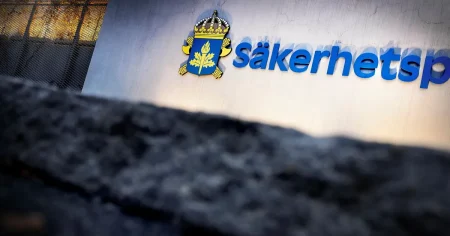A political scandal has rocked the Swedish municipality of Alingsås, exposing a clandestine power dynamic operating behind the façade of official governance. An investigation by Göteborgs-Posten (GP) revealed that the municipality’s top leaders, Moderate Party chairman Daniel Filipsson and Social Democrat vice-chairman Simon Waern, along with a former Left Party politician, had been secretly orchestrating political decisions through private chat channels since the spring of 2023. This covert alliance bypassed established democratic processes, effectively sidelining both their respective political parties and the electorate.
The revelation of these secret chats has exposed a deeply concerning pattern of manipulation and disrespect. While a minority coalition government comprised of the Moderate Party, Christian Democrats, and Liberals had ostensibly governed Alingsås with the support of the Social Democrats, the private communications paint a dramatically different picture. Filipsson and Waern, according to the leaked chat logs, viewed the official governing structure as a mere charade, believing true power resided solely with them. Their conversations reveal a dismissive and cynical attitude towards their colleagues and constituents, punctuated by derogatory and sexist remarks. This clandestine channel served as a forum for backroom dealings, where political strategies were formulated and party secrets were exchanged, all while denigrating fellow politicians and civil servants.
The leaked chats unveil a disturbing blend of political maneuvering and personal attacks. Concrete policy proposals were interspersed with crass jokes, sexist commentary, and disparaging remarks about colleagues. This fusion of serious political discussion with inappropriate and offensive banter underscores the extent to which Filipsson, Waern, and their unnamed accomplice had blurred the lines of professional conduct. One example cited by GP is Waern casually suggesting to Filipsson that they “coordinate with each other” regarding the upcoming budget, a clear indication of their intent to circumvent official channels and pre-determine outcomes. This manipulation of the political process undermined the principles of transparency and accountability that are fundamental to a functioning democracy.
Adding another layer of complexity to this scandal is the reported existence of a system of mutually assured destruction, dubbed the ”terror balance,” among the three individuals involved. This implies they each held compromising information on the others, ensuring silence and preventing leaks. This system of checks and balances, designed to protect their secret alliance, further highlights the calculated and manipulative nature of their actions. By creating a web of interdependence based on potentially damaging information, they effectively silenced any potential dissent or whistleblowing within their own ranks. This dynamic fostered an environment of secrecy and mistrust that ultimately eroded the foundations of democratic governance within the municipality.
Following GP’s request for comment on the leaked chats, both Filipsson and Waern swiftly resigned from all their political positions. In their respective statements to GP, both politicians acknowledged the impropriety of their actions. Filipsson described the period as a ”sick period” characterized by mutual provocation and inappropriate joking, admitting that their conversations devolved into sexism and other offensive remarks. Waern similarly acknowledged the ”obviously joking jargon,” which he admitted was ”completely inappropriate in retrospect,” and characterized the comments as ones that should never have been uttered. While these statements offer admissions of wrongdoing, they fail to fully address the gravity of undermining democratic processes through their secret pact.
The Alingsås scandal serves as a stark reminder of the importance of transparency and accountability in government. The actions of Filipsson, Waern, and their associate demonstrate how easily established democratic procedures can be circumvented when those in positions of power prioritize personal agendas over the public interest. This case underscores the critical role of investigative journalism in holding those in power accountable and exposing abuses of power, ultimately safeguarding the integrity of democratic institutions. The fallout from this scandal will undoubtedly have lasting consequences for the municipality and serves as a cautionary tale for other political bodies across the country. It highlights the need for robust mechanisms to prevent such abuses of power and emphasizes the crucial role of a vigilant press in uncovering and reporting on such instances of political malfeasance.














